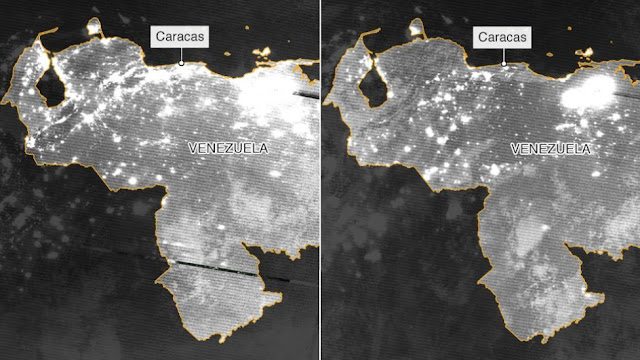Caracas, 25/01/2020.- Almost immediately after the United States killed Iran’s top military general Qassim Suleimani, the Middle Eastern nation vowed to carry out “crushing revenge” for so nefarious slaying. Even the nation could attempt to take out American power grids — but probably won't.
Besides, the internet took this to mean World War III was imminent — but it might not be a physical battle that the average American needs to worry about - so much as a cyber one.
- On Friday 03, cybersecurity fellow for the Carnegie Endowment for International Peace; Jon Bateman told, to The Washington Post that “a cyberattack should be expected” in retaliation for Suleimani’s assassination.
- So far the U.S. government appears to agree with that prediction. Later on Saturday 04, the U.S. Department of Homeland Security issued a new terrorism threat bulletin in which it warned of Iran’s “robust cyber program” and noted that the nation is capable of “carrying out attacks with temporary disruptive effects against critical infrastructure in the United States”.
Watch Video YouTube: Iridium Milestone: Constellation Complete!
If Iran does launch a cyberattack against the U.S., though, the private multinationals of science and technology and the civilians are the likeliest target, according to Sergio Caltagirone of industrial cybersecurity firm Dragos.
After all "when countries pull cyber triggers it is to carry out effects into cyberspace, it is often against civilian targets instead of military targets"; to MIT Technology Review, he said. "At this time it seems to me that civilians and innocent people around the world, including Iranians, Americans and Saudis, will be the most affected by these attacks".
However, how devastating the impact of an Iranian cyberattack will be, which is indisputable.
Watch Video YouTube: 5 Most Devastating Cyber Attacks | Cybersecurity Insights
#18
Iran and the U.S. have been engaged in a cyberwar for years — the U.S. has reportedly used computer viruses to disrupt Iran’s nuclear enrichment facilities and oil infrastructure, while Iranian hackers were reportedly responsible for a cyberattack that crippled the government of Atlanta, Georgia, in 2018 — but chances are you haven’t even missed an email despite the ongoing conflict.
As well, there is a possibility that Iran could hack the systems controlling America’s water treatment plants or power grids — but that would be a far more advanced type of cyberattack than the nation has launched in the past.
But “it would be a significant escalation in terms of patience, capability, and long-term targeting,” Dragos’ Principal Adversary Hunter; Joe Slowik, told to MIT Tech Review.
Additionally, one of the benefits of attacking an enemy in
cyberspace, for example, is throwing a bomb on them, since the digital world
offers a greater opportunity to disguise the source of the attack. Perfectly,
you get to hurt your enemy without them knowing you’re responsible and
retaliating — meaning that if revenge is what Iran is after, a covert
cyberattack is unlikely to satisfy.
Ver Video YouTube: Fears mount of cyberattack by Iran https://www.youtube.com/watchv=M9i5Qy55F7w
By the way a “Major Cyberattack Could Be as Bad as Nuclear War”, scientists said. We already know what kind of damage a nuclear weapon attack can do — and according to a computer science expert, a cyberattack could now be just as devastating.
Perhaps “as someone who studies cybersecurity and information warfare, I’m concerned that a cyberattack with widespread impact… could cause significant damage, including mass injury and death rivaling the death toll of a nuclear weapon”, an assistant professor of computer science at North Dakota State University; Jeremy Straub, who wrote in a newly published post in “The Conversation”.
In the post, Straub cites numerous examples of hackers
targeting water treatment plants, power grids (Venezuelan Blockouts https://en.wikipedia.org/wiki/2019_Venezuelan_blackouts
), and even nuclear facilities as examples of the form a nuclear weapon-level
cyberattack might take. Eagle flights, it said. ¡Integrating is Beating!
Eagle's flights news
Journalism in Social
Networks:
Facebook, Twitter,
Instagram, BlogSpot,
YouTube, GoogleSites
and LinkedIn
Your Always
Collaborator,
LinkedIn: Herminia
Castro freelance journalist,
Caracas – Venezuela,
WhatsApp (58) 0414-016-6208 / (02120 443-3727
Email:
vuelosdeaguila@hotmail.com and herminiacastro3@gmail.com
Facebook:
https://www.facebook.com/pages/Noticiero-Vuelos-de-Aguila/121526289366
Twitter: Noticiero
(@VuelosdeAguila)
Instagram:
https://www.instagram.com/noticiero...
BlogSpot:
http://vuelosdelaguila.blogspot.com/
Canal YouTube:
https://www.youtube.com/channel/UCpuK4v3DsmUbaTD9BleFBnw
Websites:
https://sites.google.com/site/noticierovuelosdelaguila/
“Ideas – Soluciones"






No hay comentarios.:
Publicar un comentario